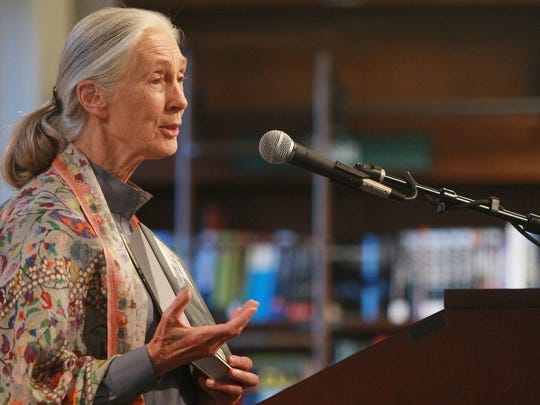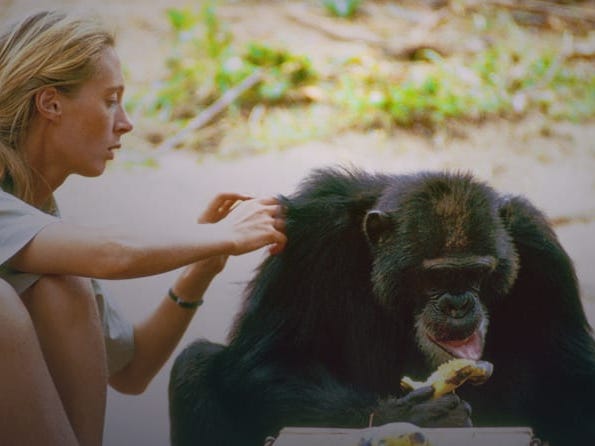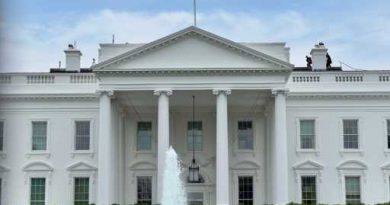Jane Goodall Q&A: How did our relationship with the environment lead to COVID-19? How do you maintain optimism for the future?
At 87, Jane Goodall remains as committed to her beloved animals as ever. Although she made her reputation studying chimpanzees in the wild, now most of the wildlife she sees are birds in the garden of the English house she grew up in.
In demand all over the world, Goodall used to return to her childhood home for a few days to a few weeks at a time, but she’s been there full-time for the duration of the COVID-19 pandemic, eating her lunchtime sandwich every day in the shade of the same beech tree she climbed as a child.
These days, she’s extremely worried about climate change and species extinction, but remains hopeful that public attention – especially from children – will save the animals and the planet. Twenty years ago, she helped found an organization, called Roots & Shoots, to bringing together young people to work on environmental, conservation and humanitarian issues. Their efforts continue to motivate her.
This week, Goodall won the prestigious Templeton Prize, which has been awarded since 1972 to luminaries such as Mother Teresa, the Dalai Lama, and South African Archbishop Desmond Tutu. In recent years, the prize, now worth $1.5 million, has been awarded to scientists, opinion leaders, scholars, and religious leaders, people who “advance our understanding of, and appreciation for, the insights that science brings to the deepest questions of the universe and humankind’s purpose and place within it.”
Goodall spoke with USA TODAY via Zoom about her religious beliefs, the state of the world, and how she remains optimistic in the face of global challenges.
Jane Goodall won the prestigious Templeton Prize, which has been awarded since 1972 to luminaries such as Mother Teresa, the Dalai Lama, and South African Archbishop Desmond Tutu. (Photo: Stephen Lovekin / Getty Images)
Question: Do you think the pandemic has changed people’s attitudes about the environment?
Answer: Yes, people are beginning to understand that we brought this pandemic on ourselves by our disrespect of nature and animals. More people are realizing if we don’t create a new relationship with the natural world and a new, more sustainable future for our great-great grandchildren, it’s more than bleak. We’ve got a window of time to turn things around, but I have no idea how big it is. And I also know that it’s closing.
Q: How did our relationship with the environment lead to this pandemic?
A: We’re invading animals’ habitats, driving them closer together, enabling bacteria to spill over from one animal to another, crowding animals closer to people. And that’s creating an opportunity for bacteria to jump from an animal to a person, creating another a new disease. And then we hunt them, kill them, eat them, traffic them, sell them for food or medicine or clothing or as pets in wildlife markets. If we don’t change, there’ll be more pandemics and they could be worse. And people are just beginning to listen and understand this.
Q: You think biodiversity loss is an even greater threat than pandemics. Why?
A: The birds I knew as a child right here, half of them have gone. That’s because of people using pesticides and herbicides in their gardens, a little bit of climate change, lots of wild habitat gone. I used to put my alarm clock at 4 a.m. so I could hear the dawn chorus. There isn’t a dawn chorus anymore. There’s a blackbird and there’s a robin and a great tit and the rest have gone.
I learned in the rainforest that every native species has a role to play in this tapestry of life – they’re all interconnected. The loss of one can lead to the loss of another and so on. Every time one species disappears from an area, it’s like pulling thread from that tapestry and as you pull more and more threads the tapestry gets weaker and you get ecosystem collapse.
Watch decades of unseen footage of Jane Goodall and her jungle research. (Photo: Disney+)
Q: Yet you still manage to be hopeful enough to spend every waking minute encouraging other people. How do you maintain your optimism?
A: The reason to hope is the indomitable human spirit. It seems impossible to give up when there are people who overcome tremendous physical disabilities or social disabilities, and they are really an inspiration.
By taking action, no matter what small thing it is, like clearing a place of litter or getting a letter writing campaign, introducing a bit of legislation or whatever it is, that gives you hope to carry on. Hope makes you more active and it inspires others and makes them active, too, and so it spirals into a feeling of hope that we must get together and take individual action and force companies and governments to do what they should be doing before it is too late.
Q: You won the Templeton Prize for your work at the intersection of science and religion. Is your research and passion for the environment informed by religion?
A: Finally, science and religion are beginning to come together and the line between them is blurred. I have sensed some spiritual power, which I wouldn’t like to try to define. I feel it really very strongly when I’m out on my own in nature, feeling spiritual connection with the natural world. It’s an amazing feeling.
Q: Although most of your relatives have lived well into their 90s, you’ve clearly started thinking about your legacy and your future. What do those look like to you?
A: The other day in a lecture someone asked me, ‘What’s your next great adventure?’ So I thought and I said, ‘Well, dying.’ There was a kind of silence and a few titters. And I said, well, when you die, there’s either nothing, in which case fine, that’s it. If there’s something, I can’t think of a greater adventure than finding out what that is.
Jane Goodall releasing her new book in fall 2021. (Photo: FABRICE COFFRINI, AFP via Getty Images)
Q: What will you do with the money from Templeton, which comes with no strings attached?
A: I’m really, truly grateful and excited because the money will enable me to do many things for projects that I couldn’t do before. I just started a legacy foundation, the Jane Goodall Legacy Foundation. At the moment a lot of (charities) are kept going by my visits or Skype calls or whatever, and when I’m not here, that will stop, obviously. So, I want to be sure there is an endowment so that my dreams can carry on.
This interview has been edited and condensed.
Contact Karen Weintraub at [email protected].
Health and patient safety coverage at USA TODAY is made possible in part by a grant from the Masimo Foundation for Ethics, Innovation and Competition in Healthcare. The Masimo Foundation does not provide editorial input.
Source: Read Full Article



